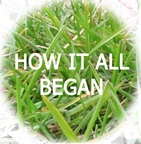
|
„Hearing the grass grow“
It all started while I was leisurely reading my newspaper on a park bench. I suddenly heard a faint crackling. I tried to listen more closely, to determine where the sound was coming from. The longer I listened, the louder it got. I began to understand the first words "...thirsty". One blade of grass croaked "I'm dying of thirst." The next blade of grass snapped at me, "I'm starving". I said "I really try hard listening to you! But what can i do for you?" Then the situation got even worse. The entire lawn began to yell at me: "This is a revolt!”. “This is a grass uprising!" You’re probably wondering now, why the grass was yelling at me. I did ask myself this question too, of course… until I finally woke up bathed in sweat from my nap in the park.
Shortly after my dream, I had a second key experience. During her speech, the German Federal Research Minister Annette Schavan, announced emphatically: "We want to hear the grass grow [German phrase that here means: we have to develop our sixth sense], because that helps us to set the course of research policy early." Certainly, I was immediately reminded of the grass uprising. I wondered what would the grass say about today's research policy. By saying 'we want to hear the grass grow' Schavan was symbolically speaking. She surely did not mean that new scientific policy should fund research into how the photosynthesis of a plant could be made audible nor about how to give grass a voice. No. The grass, and the whole natural world does not have any decision power. "But how about if we could give the grass a voice?” This question hooked me. How could I represent the legitimate voice of nature? How could I, if even myself as a common EU-citizen, have no chance in taking part in the decision-making of research policies. "This day might come", I thought.
This decision to be an advocate for the voice of nature, felt quite magnificent. Now I had a mission! But shortly after, the first doubts worried me: "I don’t know enough about it", "It’ll take up too much time". Other people said - "Isn’t it much better that decisions affecting our existential resources are taken by experts rather than by some citizen enthusiasts?" In short, I thought - "Someone else should take care of it" and "Why me?”
But then, I imagined my niece’s big eyes when I told her that I didn’t care about more and more species dying. During this time I had my third key experience, at the community garden in Berlin's Tempelhof Park. I watched how some landscape designers were helping the urban gardeners to create raised beds. Afterwards the gardeners assisted their research colleagues to tend their gardens. The gardeners also told me about a collaboration they were planning with a research group to tackle the problem of strong winds in the park. I had found them: the citizen scientists, broadening their knowledge while sharing it.
What is it that I want to convey to you from these three key experiences i had? First, my surprise at hearing the voice of nature. Second, my wish to be an advocate for the voice of nature… and third, despite all my concerns, the certainty that I can do something about it. It's not too late. No one else should do it for me.
Maybe you also have a blade of grass growing in your life? Perhaps there is an issue you would like to explore and debate with some scientists? Probably you are already engaged in giving nature its right to vote. If not, I hope I have inspired you to take care about it… and, yes, I encourage you to listen to the grass growing from time to time... |